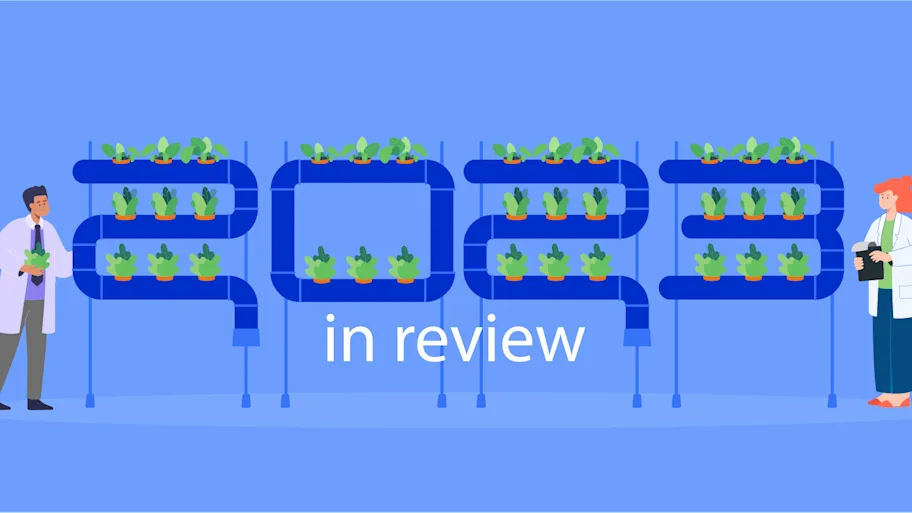
- Science news
- Frontiers updates
- 2024 in review: a message from our CEO
2024 in review: a message from our CEO

As another year draws to a close, I’d like to take a moment to reflect on the highlights of 2024 – a year in which quality and research integrity continued to be at the top of our agenda – and celebrate some significant achievements as we champion open science.
We are unwavering in our mission to make science open, so that scientists can collaborate better and innovate faster to deliver the solutions that enable healthy lives on a healthy planet. However, only validated, high-quality research can gain society's trust and help the world solve its most pressing challenges.
Our commitment to quality and research integrity
Upholding quality and integrity is part of our commitment to the research community and is built into everything we do.
Our focus this year has been to reject problematic submissions and maintain a high level of precision in our desk review rejections. Our research integrity team is not only one of the largest, but also uniquely positioned in the publishing industry: we integrate and build high-tech AI solutions to enable our team to proactively investigate research misconduct, from image manipulation to large-scale paper-fabrications and organizational fraud. Equipped with more than 60 quality checks (and counting) and supported by AIRA, our AI review assistant, our team starts checking articles at submission and prevents those that do not meet our quality thresholds, or those that exhibit signs of misconduct, from entering peer review. In 2024, more than half of all article rejections were performed by our research integrity team, thus ensuring quality controls are upheld and alleviating the workload for our editorial boards.
You can read more about quality and research integrity at Frontiers or hear from the team themselves, as they discuss what makes our approach to research integrity unique.
Nearly 1,000 Frontiers’ editors joined our webinar sessions in November where we discussed preventing publication fraud, shared guidance on the ethical use of AI and provided more insights into how our teams work. 95% of our live audience rated their experience positive or very positive, so in case you missed it:
watch Elena Vicario, Head of Research Integrity, provide an update on the use of AI to improve peer review, and how our peer review process supports the prevention of fake articles, forged authorship, manipulated images, and peer review manipulation
watch Marie Soulière, Head of Editorial Ethics and Quality Assurance, who provides guidance on the use of artificial intelligence (AI) in publishing and summarizes Frontiers’ efforts to raise awareness of publishing ethics topics and our collaboration with other publishing stakeholders.
The outcome of our work is quantifiable as we ask thousands of researchers every year to rate the quality of our articles, peer review, editorial boards as well as their overall experience with us. Our continued efforts on fortifying our quality controls result in continuously high and improved ratings:
94% of researchers rated the quality of our articles as excellent or good
92% of researchers rated the quality of our peer review as excellent or good
93% of researchers rated the quality of our editorial boards as excellent or good

As well as the quality of the research we publish, we obsess over providing a high-quality publishing experience for the researchers in our community. Our continued work in this area has also resulted in improved ratings this year:
91% of published authors rated their experience from submission to publication as excellent or good
87% of reviewers rated their experience of being a reviewer as excellent or good
80% of handling editors rated their experience handling a manuscript as excellent or good
75% of topic editors rated their experience editing a Research Topic as excellent or good

Championing open science
Thanks to advances in science we enjoy longer, healthier, and more prosperous lives than ever before. When it is openly available, society can generate more knowledge, and we can accelerate innovation, health, and prosperity for all. We’re making science even more powerful by removing the barriers to publish open access, enabling transformational collaboration and mobilizing global communities.
Flat fee agreements
Our flat fee agreements radically simplify the payments for open access publishing. Our goal is to gradually shift away from payments for individual articles to annual payments by institutions, funders, and national consortia. This greatly improves the experience for authors and provides institutions with more efficient annual budget planning with a single, predictable, discounted annual fee for unlimited publishing. In 2024, we finalised flat fee agreements with the University of California, the German National Consortium, and with the Swedish consortium Bibsam and supported 76 of our institutional partners to convert to a flat fee publication model.
Frontiers in Science
Since launching in February 2023, Frontiers in Science has rapidly advanced toward its goal of becoming the world’s most impactful multidisciplinary journal. It focuses on transformational science addressing global challenges, publishing high-impact articles by renowned researchers. In 2024, the journal published 65 articles across 13 research hubs on topics like infectious diseases, climate change, and green hydrogen. These articles have attracted over 850,000 views, 120,000 downloads, and 280 citations, along with significant media coverage in outlets like The Guardian and CNN. Our live events were attended by over 3,200 scientists and policy makers, and speakers included representatives of the World Health Organization, the Organization for Economic Co-operation and Development, the Global Methane Hub, and the International Union for Conservation of Nature.
Frontiers Planet Prize
The Frontiers Planet Prize recognizes and celebrates scientists who address key planetary boundaries and whose work contributes significantly to understanding and solving pressing environmental challenges. Our 2024 award ceremony recognized 23 National Champions and brought together leading academics, policymakers, and philanthropists to foster connections and share knowledge and ideas - an essential step on the path to addressing planetary health. I outlined why we started this prize and its importance at the award ceremony where we also honoured this year’s three international champions:
Dr Pedro Jaureguiberry, Instituto Multidisciplinario de Biologica Vegetal, Argentina
Prof Peter Haase, Senckenberg Society for Nature Research, Germany
Prof Jason Rohr, University of Notre Dame, USA
With this prize, we aimed at igniting a competitive Olympic spirit and pride amongst institutions and countries to nominate their best researchers and the best solutions to achieve planetary health. Entering its third edition, there are now 610 institutions, and more than 4,000 researchers registered to participate; and we expect to announce next year’s national champions on Earth Day 2025.
As scientists, we are uniquely positioned to deliver solutions for pressing global challenges, and by working together on projects like these can we harness the full potential of open science to accelerate these solutions and make a real positive impact on human and planetary health.
From everyone here at Frontiers, and from my family to yours, I wish you all the best for the holiday season and the new year.
Dr Kamila Markram, CEO and co-founder, Frontiers






